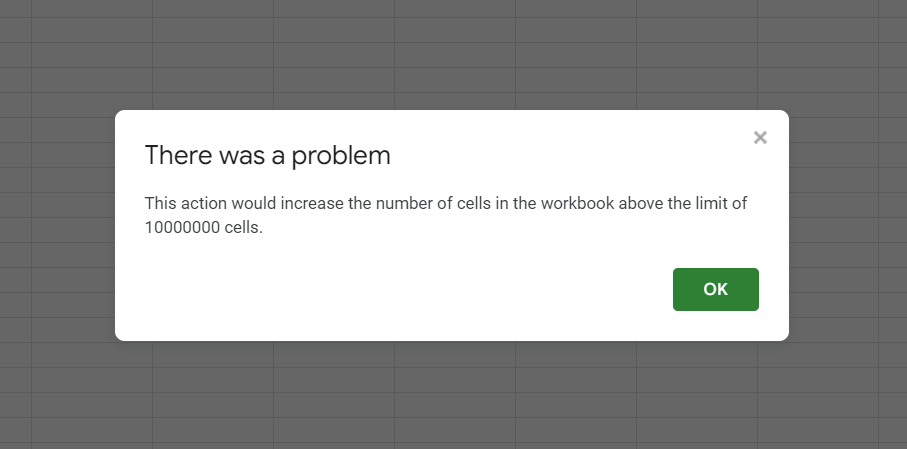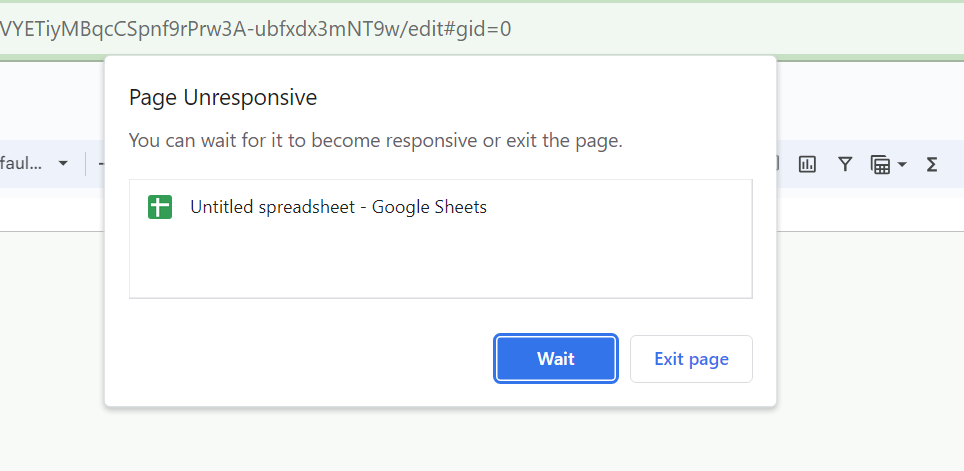Google Sheets is the most popular cloud-based spreadsheet application, but it was not built for big data. Google Sheets slows down or crashes when working with large datasets. To work with big datasets or efficiently connect your data warehouse to a spreadsheet, you'll need a better Google Sheets alternative. This guide explores the best Google Sheets replacements and shows why Row Zero is the best alternative to Google Sheets for big data. Click to a section below or continue for the full guide.
- What is Row Zero?
- 5 Reasons You Need An Alternative to Google Sheets
- Best Google Sheets Replacements
- Why Row Zero is Better Than Google Sheets for Big Data
- Google Sheets Pricing vs Alternatives
- Conclusion
What is Row Zero?
Row Zero is the best spreadsheet for big data. Row Zero supports billion row spreadsheets and connects directly to your data warehouse. It's super fast and supports your favorite spreadsheet functions like pivot tables, charts, SUMIFS, XLOOKUP, etc. Row Zero also matches the experience of Excel and Google Sheets so it is a great Google Sheets replacement for big data users. If you've used Google Sheets, you can get started with ease, with no training required. You can try Row Zero for free.
5 Reasons You Need An Alternative to Google Sheets
You work with big data
Google Sheets does not work with large datasets. Google Sheets has a 10 million cell limit, which means Google Sheets slows down or crashes when you work with spreadsheets with many rows or columns or have multple large sheets in a workbook. Excel can handle slightly larger datasets but has a row limit of 1,048,576 rows. To continue working with Google Sheets, users often have to cut up their data into smaller slices.
Google Sheets is slow or crashing
Google Sheets slows down well before the 10 million cell limit, especially if you're working with external data connectors, complex formulas, or have multiple large sheets within a workbook.
You need to process heavy workloads
There are a number of Google Sheets functions like IMPORTXML and ARRAYFORMULA that require heavier processing and can cause Google Sheets to slow down with heavy usage. Complex pivot tables, nested IF and Query functions, and heavy use of LOOKUP or INDEX functions can also cause Google Sheets to slow down or crash.Your data changes and requires frequent recalculation
If your source data changes frequently and is referenced in a large amount of formulas and calculations, Google Sheets is not a good option. For example, Google Sheets struggles to work with high volumes of real-time data like stock quotes or live, streaming data.You want to connect live to your data source
Google Sheets has a fairly robust add-on marketplace that offers connectivity to popular data sources like Snowflake and SaaS services like Salesforce. However, these can be expensive and complicated to work with. As mentioned above, Google Sheets can't handle large data sets and can slow with frequent data changes, so if you want to connect your data warehouse to a spreadsheet, Google Sheets may not fit your needs. Otherwise, you'll need to limit yourself to working with smaller subsets of data that fit within Google Sheets limits.
Best Google Sheets Replacements
Many of these are free alternatives to Google Sheets but also have paid upgrades for enterprise features.
Best for Big Data: Row Zero
Row Zero spreadsheets are built for big data. Row Zero powers billion row spreadsheets and connects directly to your data warehouse. It's super fast even when doing work that would make Google Sheets crash. You can easily share, open, and edit multi-GB files allowing users to open CSV files too big for Google Sheets and open and edit parquet files, which cannot be opened with Google Sheets. For these reasons, Row Zero is better than Google Sheets for big data.Best for 1 to 1 Replacement: Excel 365
Micosoft Excel is the most popular spreadsheet globally and Microsoft 365 has a cloud-based version of Excel that offers many of the same features that originally made Google Sheets popular, like real-time collaboration and "from everywhere" accessibility. For most use cases, Excel and Google Sheets are interchangeable and files generally can be transferred between them with few issues. Note that while Excel can handle slightly larger datasets, Excel also does not work with big data, so you still may need an alternative to Excel for big data needs.Best Open-Source Alternative: OpenOffice
OpenOffice is the most popular open-source spreadsheet application making it a good free alternative to Google Sheets.BI Tools as Google Sheets Replacements
Beyond the spreadsheets above, BI tools are often used to perform some of the same data analysis that has historically been done in spreadsheets, especially to analyze big data. Popular business intelligence tools include PowerBI, Tableau, and Looker which is also a Google product. However, these BI tools are not spreadsheets so they may not be the best substitute for Google Sheets depending on your needs.'Spreadsheet-like' Data Platforms
There are a number of big data analytics platforms that offer a 'spreadsheet-like' interface and the ability to work with large datasets. Some options here include Sigma Computing, Gigasheet, and Equals.com. While these can be used as an alternative to spreadsheets for large datasets, they are not actual subsitutes for Google Sheets and do not match the full functionality of spreadsheet programs. They also tend to be fairly expensive compared to alternatives like Row Zero.
Why Row Zero is Better Than Google Sheets for Big Data
Row Zero was built for big data. Each Row Zero workbook has it's own dedicated Amazon EC2 instance, giving it unmatched power and speed versus traditional spreadsheets. Row Zero offers an experience similar to Google Sheets but can handle billion row datasets, is super fast where Google Sheets crashes, and connects live to your data warehouse. With Row Zero, you can easily open, edit, and share super large files (CSV, parquet, txt, etc.) that are too big to open in Google Sheets.
Row Zero has built-in live connections to your data source. You can easily connect to Snowflake, Databricks, Redshift, BigQuery, Postgres, and Amazon S3. Row Zero spreadsheets are powerful enough to pull entire database tables into a spreadsheet, letting non-technical users build live pivot tables, graphs, models, and metrics on data from your data warehouse without writing complex code. At any time, you can easily write-back to your data warehouse from the spreadsheet. You can also schedule data refresh and any transformations, pivot tables, and buildouts don't get overwritten when the source data refreshes. They just update with the latest data.  With Google Sheets, you'll need to purchase Google Sheets add-ons to connect to your data warehouse, and you'll still be limited by the data size limits within Google Sheets.
With Google Sheets, you'll need to purchase Google Sheets add-ons to connect to your data warehouse, and you'll still be limited by the data size limits within Google Sheets.
Row Zero is super fast. One of the biggest frustrations with Google Sheets for power users is that Google Sheets slows down or crashes when doing big data work. Row Zero workbooks run in AWS. Because the workbook sits next to your data, you can load hundreds of millions of rows from Redshift, Snowflake, and S3 in seconds. And Row Zero workbooks process in the AWS region closest to you, so it feels as responsive as a desktop app. For any big data usage, Row Zero is signficantly faster than Google Sheets.
Google Sheets Pricing vs Alternatives
You can sign up for a free version of Google Sheets for personal use with business plans of Google Workplace starting at $6 per user per month. Simlarly, Excel has a free version with a Microsoft account. For business users, Microsoft 365 pricing ranges from $6 to $22 per user per month.
For both Excel and Google Sheets, it's important to evaluate the total cost of ownership to get your work done. If you want to connect Google Sheets to your data warehouse or other data connectors, you may need to purchase expensive add-ons which can cost tens or hundreds of dollars per user per month.
Similar to Google Sheets, Row Zero offers a free online spreadsheet, but also allows you to connect to your data warehouse and supports millions of rows. Premium plans start at $8 per user per month and offer advanced data connectivity, enterprise security features, and more powerful spreadsheets. View Row Zero pricing.
Other alternatives like BI tools tend to be very expensive and "spreadsheet-like" alternatives like Sigma Computing often cost tens to hundreds of dollars per user per month.
Conclusion
When you start working with big data, you'll likely need to upgrade to a better Google Sheets alternative. Row Zero offers an experience similar to Google Sheets but is built for big data. Forutnately Row Zero offers a free plan for basic usage and enterprise options that are priced lower than many Google Sheets add-ons and connectors.